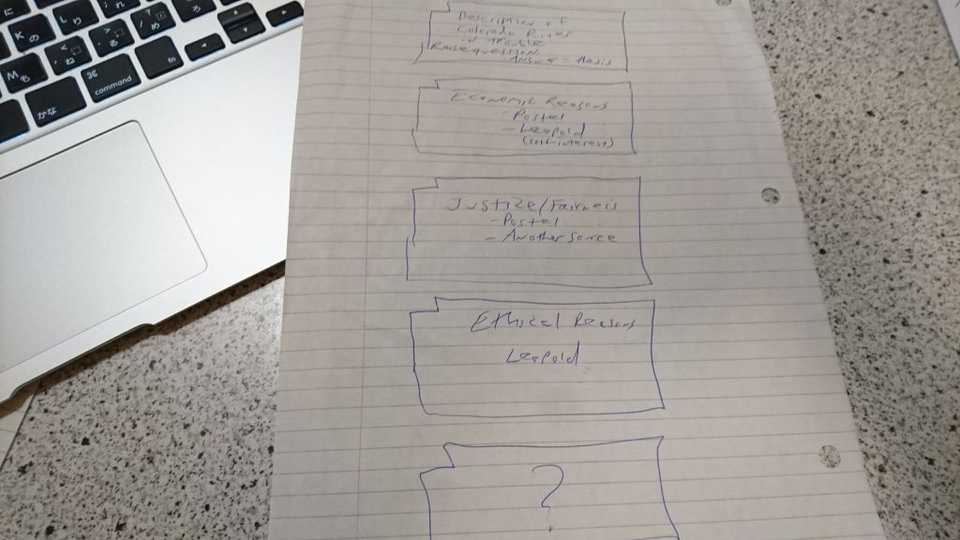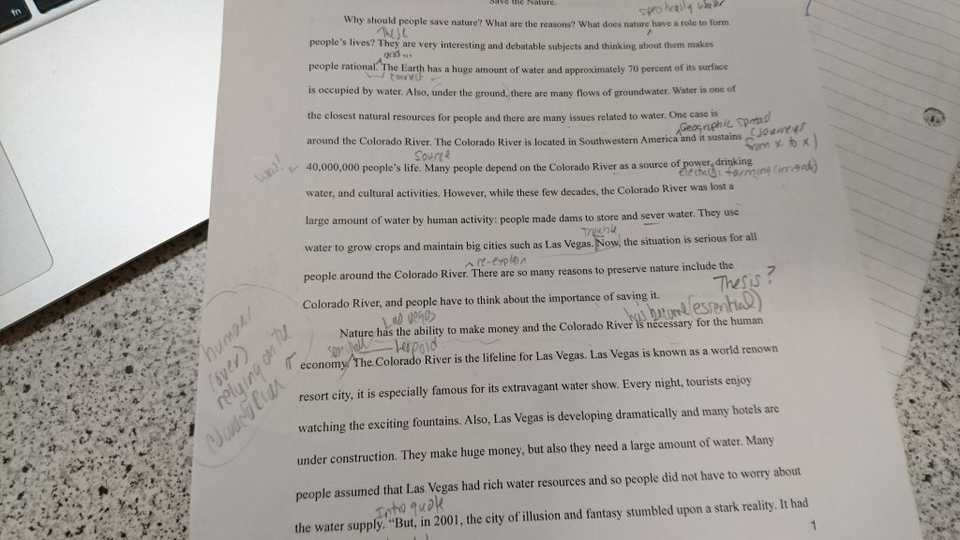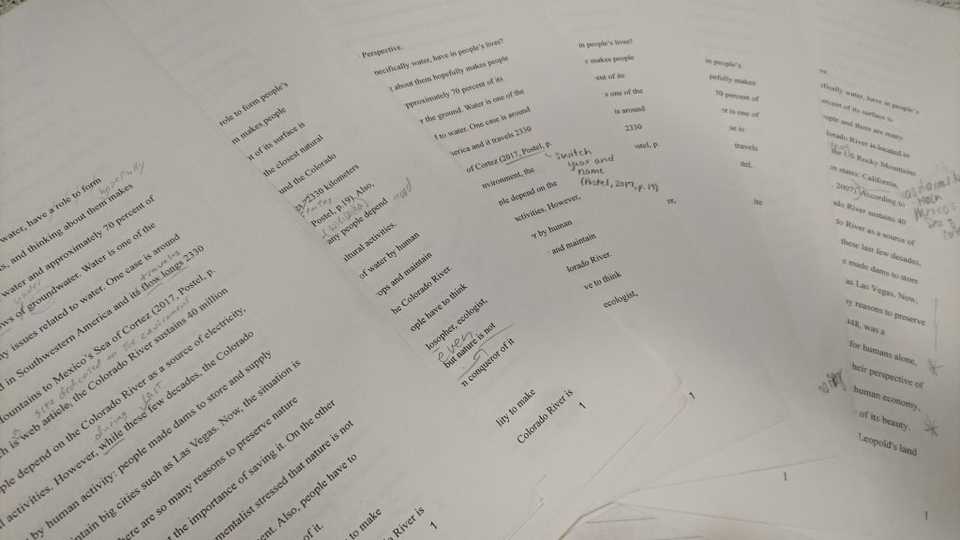先日、無事2回目のエッセイの提出を終えました。前回のエッセイでは失敗してしまいました。今回はその失敗を踏まえて、色々対策をしました。
(今回の記事にエッセイ全文を載っけているのでここまで長くなりました。飛ばして大丈夫です笑)
対策
何度も先生の所に行き添削してもらい、修正を繰り返しました。
まず最初にやったのは先生に書こうと思っていることを確認しました。書くことの方向性を間違えて、書き直しになったら大変です。
こんな感じに段落ごとに書く方針を示してもらえました。
その後、Draftを書きました。最低語数より200 wordsくらい少なかったですが、そこからどこを膨らませればいいか考えました。
最初の段落の最後にはThesisとして、エッセイを通しての主張をエッセイの構成と共に示すように言われました。
この後は添削→修正→添削→修正を繰り返しました。
色々、アドバイスをもらえました。以下は例です。
- 第一段落では問題提起→文章を通しての答えを書く。
- 各段落ごとに1つテーマを持たせる。それを1文目に明快に興味を引くように書く。
- 文章全体の流れを作る。段落が変わっても前の段落で述べたことからの流れを考慮する。
- 完了形の使いどころが曖昧。過去形だと不自然な所がある。
- 文章の最後には気の利いた一文を入れる。
- 引用はどんどん使っていい。それだけ文章に説得力を持たせられる。
- 文章をプツプツ切らない。主張に関係ない説明的な文章はくっつける。(, who ~, みたいな感じに)
人に見せる前には一応、このようなWebでグラマーチェックしてもらえるサービスも活用しました。
https://www.grammarly.com/grammar-check
Chromeの拡張機能版もあって、メールするときにも便利です。
実際に書いたエッセイ
最終的なエッセイはこれです。
Save Nature with a New Perspective.
Why should people save nature? What role does nature, specifically water, have in people’s lives? The Earth has a huge amount of water and approximately 70 percent of its surface is occupied by water. Water is one of the closest natural resources for people and there are many issues related to water. One case is around the Colorado River. The Colorado River travels 2330 kilometers starting in the US Rocky Mountains, passing through 7 states: California, Arizona, Nevada, Wyoming, Utah, Colorado and New Mexico (Cbsnews, 2007) and ending at Mexico’s Sea of Cortez (Postel, 2017, p.19). “The Colorado River sustains 40 million people’s lives” (Philpott, 2014). Many people depend on the Colorado River as a source of electricity, farming, drinking water, and cultural activities. However, during these last few decades, the Colorado River has lost a large amount of water by human activity: people made dams to store and supply water. They used water to grow crops and maintain big cities such as Las Vegas. Now, the situation is serious for all people around the Colorado River. There are many reasons to preserve nature, including the Colorado River. Aldo Leopold, who lived from 1887 to 1948, was a philosopher, ecologist, and environmentalist stressed that nature is not property for humans alone, even if nature is essential for economic development. Also, people have to shift their perspective of nature from conqueror of it into member and citizen of it. Nature is necessary for human economy, and at the same time, it has a right to be preserved with its intrinsic justice because of its beauty. This is a time to a establish respectful relationship between people and nature with Leopold’s land ethic.
People in Las Vegas are over-relying on the Colorado River. Nature has the ability to make money and the Colorado River has become essential for human economy. The Colorado River is the lifeline for Las Vegas. Las Vegas is known as a world renown resort city. It is especially famous for its extravagant water shows. Every night, tourists enjoy watching the exciting fountains. Also, Las Vegas is developing dramatically and many hotels are under construction. They make huge amounts of money, but they also need a large amount of water. Many people assumed that Las Vegas had rich water resources, so people did not have to worry about the water supply, “but, in 2001, the city of illusion and fantasy stumbled upon a stark reality. It had run out of water” (Glennon, 2009). Las Vegas gets water from the Colorado River. In the past, the Colorado River has had a huge water supply, but now, its water level has been reduced. People in Las Vegas are worried about their livelihood because of the change. If they lose it, they can’t sustain their life and they will suffer huge economic damage. As a result, they started to find solutions to this water issue. For instance, they have found another source of water. Groundwater. Also, the government made a law to regulate the uses of tap water. It is to some extent possible to maintain the life and their economy, for now, but the future is unknown.
On the other hand, Leopold offered advice that “system of conservation based solely on economic self-interest is hopelessly lopsided” (1949). He added an explanation: “no important change in ethics was ever accomplished without an internal change in our intellectual emphasis, loyalties, affections, and conviction” (Leopold, 1949). People still find value in only the economical aspect of nature and it is meaningless to conserve it just for this value. If they restore nature, they will destroy it again for their profits. Therefore, while there are several economic reasons to save the Colorado River, ultimately, people need to maintain a respectful relationship between people and nature.
In addition to the revaluation of the relationship between people and nature, preserving the Colorado River is necessary from the point of justice. There is justice in and of itself in preserving it. As a example of injustice against the Colorado River, people in Mexico and especially America has detoured a large amount of water for their cities such as Las Vegas and farming crops. Postel, who is the author of Replenish, put into words: “The Colorado River became less like a river and more like an elegant plumbing system” (2017, p.21). Once the two countries realized their fault and signed a treaty in 1944 to decide how to divvy up the water resources. Mexico was allowed to use 10 percent of the river’s flow, and America was 90 percent of it (2017, p.21). However, it was not enough, and people overlooked the justice to nature. They divided water the resource among the two countries. Did water remain for nature? No, it didn’t. There is 0 percent of water left for the river, which means the river flow couldn’t reach the sea. It was obviously injustice to nature.
Leopold mentioned that nature is not only for humans. Nature is one part of a huge ecosystem. The Colorado River forms Colorado Delta. Colorado Delta provides a crucial stopover for millions of migratory birds on the Pacific Flyway (Postel, 2017, p.20). This is just one case of many benefits provided by the Colorado River. It allows the whole ecosystem to make it varied and beautiful. According to a scholar article written by Adrian Armstrong, “water is an essential component of all life, and a ‘water ethic’ should strive to ensure that each organism in the whole has the water it needs, in the appropriate condition” (2005). Therefore, it is obvious that nature is not only for a specific country or people, they have to save and share the natural resources among not only themselves but also nature itself.
Postel argued about nature from a more practical aspect. On the other hand, Leopold thought about how it was a more spiritual issue. He said that people have to change their mind on the relationship between them and nature. It is a fact that nature is crucial for economic development. However, nature is not property, and it is not only for humans because nature has an important role in the ecosystem. People need to treat nature more like their friend and less like a money tree.
References
Armstrong, A. (2006). Ethical Issues in Water Use and Sustainability. Area, Vol. 38 Issue 1, pages 9 -15.
Cbsnews (2007, December 24). 7 States Sign Colorado River Pact. CBSNews. Retrieved from https://www.cbsnews.com/news/7-states-sign-colorado-river-pact/
Glennon, R. (2009). Unquenchable: America’s water crisis and what to do about it. Island Press.
Leopold, A. (1949). A Sand Country Almanac. Oxford University Press.
Postel, S. (2017). Replenish: The virtuous cycle of water and prosperity. Island Press.
Philpott, T. (2014, August 4). 40 Million People Depend on the Colorado River. Now It’s Drying Up. Mother Jones. Retrieved from https://www.motherjones.com/food/2014/08/southwests-water-crunch-even-worse-we-thought/
書いてみて
1000 wordsくらい書きました。留学前はTOEFLのwritingで300 wrordsをなんとか書けるレベルでした。それがこっちに来た途端、これくらいの長さの文章を、自分で情報を集めながら書かなくてはなりません。
来る前にWritingとReadingはもっとやっておくべきでした。Readingに関しては、洋書がサラサラと読めるレベルではないと厳しいと思います。
ひたすら英語の資料を読み込むのは英語力の十分ではない自分にとっては苦痛でした。
ちなみに、このエッセイの評価はBでした。文法とか文の構成と項目が6つくらいあって全部3/4点でした。なかなかシビアな点の付け方です。
それでも前回みたいな酷い評価にならなくて良かったです。
次のエッセイはより良い評価を得られるように引き続き頑張ります。


